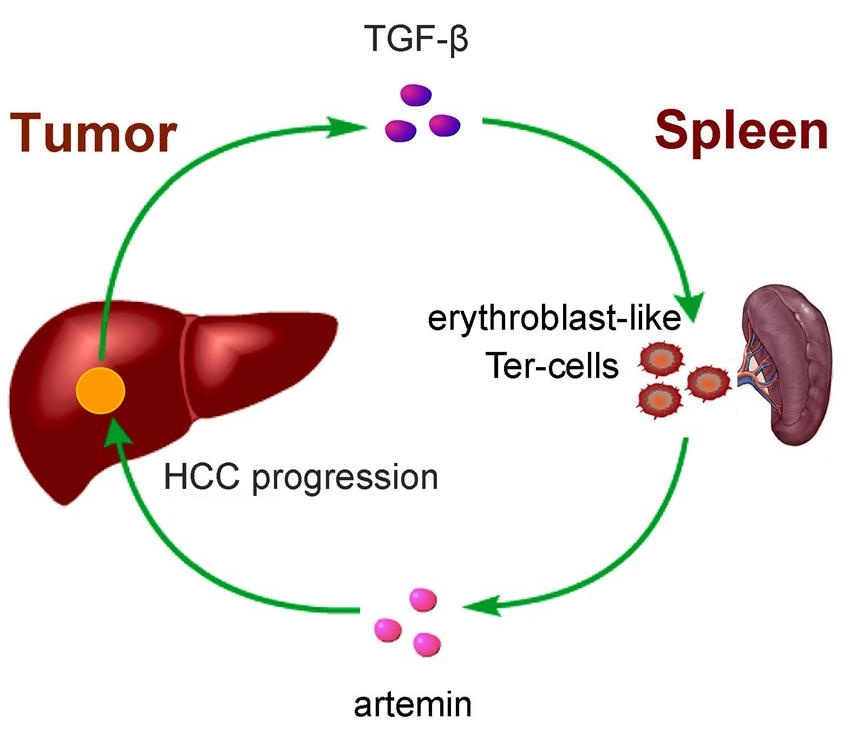Prof. Xuetao Cao’s group discovered novel tumor-induced splenic erythroblast-like cells in cancer
Source:Yanmei Han
2018-05-16
On April 19th, Prof. Xuetao Cao has published a paper in Cell about a tumor-induced new population of erythroblast-like Ter-cells in the spleen of tumor-bearing mice. And these tumor-induced erythroblast-like Ter-cells in the spleen of tumor-bearing host are important for cancer progression, and bears considerable therapeutic potential to improve cancer prognosis.
Non-neoplastic cell populations in tumor microenvironment have been reported to play critical roles in cancer progression, and targeting the tumor microenvironment is now known as a promising approach to cancer treatment. Now it’s well accepted that primary tumors can actively induce inflammatory, immunosuppressive changes and other tumor-promoting consequences in distinct organs, facilitating tumor progression and metastasis. So, identifying tumor-induced or expanded cell populations outside of tumor microenvironment and their derived circulating factors has become increasingly critical in understanding cancer as a systemic disease, and finding more effective prognosis prediction and treatment options. Whether and how primary tumors drive the generation of the previously unknown non-leukocyte cell population in distant organs at the late stage of cancer, and what’s the role of the cell population in tumor progression, remain to be further investigated.

Identifying tumor-induced leukocyte populations outside tumor microenvironment and their derived circulating factors has become increasingly critical in understanding cancer as a systemic disease and finding more prognosis prediction and treatment options. However, non-leukocyte populations, newly induced in distinct organs by primary tumors, remain further identification. In this paper, Prof. Cao’s group reports a new inducible population of erythroblast-like cells (Ter-cells) derived from megakaryocyte-erythroid progenitor cells, with a unique phenotype Ter-119+CD45-MHC-I-CD44+CD71+, in the enlarged spleen of the advanced tumor-bearing mouse models, which facilitates tumor progression by secreting neurotrophic factor artemin in the blood. TGF-β and Smad3 activation are important in Ter-cell generation. In vivo blockade of artemin or its receptor GFRα3 signaling inhibited tumor progression. In hepatocellular carcinoma patients, serum artemin is significantly elevated and correlated with poor prognosis. Identification of the new erythroblast-like population and its derivative artemin in the blood has clinical implications by serving potential prognosis predictor and therapeutic target for cancer.
Full Text Link: https://www.cell.com/cell/fulltext/S0092-8674(18)30238-1
Non-neoplastic cell populations in tumor microenvironment have been reported to play critical roles in cancer progression, and targeting the tumor microenvironment is now known as a promising approach to cancer treatment. Now it’s well accepted that primary tumors can actively induce inflammatory, immunosuppressive changes and other tumor-promoting consequences in distinct organs, facilitating tumor progression and metastasis. So, identifying tumor-induced or expanded cell populations outside of tumor microenvironment and their derived circulating factors has become increasingly critical in understanding cancer as a systemic disease, and finding more effective prognosis prediction and treatment options. Whether and how primary tumors drive the generation of the previously unknown non-leukocyte cell population in distant organs at the late stage of cancer, and what’s the role of the cell population in tumor progression, remain to be further investigated.

Identifying tumor-induced leukocyte populations outside tumor microenvironment and their derived circulating factors has become increasingly critical in understanding cancer as a systemic disease and finding more prognosis prediction and treatment options. However, non-leukocyte populations, newly induced in distinct organs by primary tumors, remain further identification. In this paper, Prof. Cao’s group reports a new inducible population of erythroblast-like cells (Ter-cells) derived from megakaryocyte-erythroid progenitor cells, with a unique phenotype Ter-119+CD45-MHC-I-CD44+CD71+, in the enlarged spleen of the advanced tumor-bearing mouse models, which facilitates tumor progression by secreting neurotrophic factor artemin in the blood. TGF-β and Smad3 activation are important in Ter-cell generation. In vivo blockade of artemin or its receptor GFRα3 signaling inhibited tumor progression. In hepatocellular carcinoma patients, serum artemin is significantly elevated and correlated with poor prognosis. Identification of the new erythroblast-like population and its derivative artemin in the blood has clinical implications by serving potential prognosis predictor and therapeutic target for cancer.
Full Text Link: https://www.cell.com/cell/fulltext/S0092-8674(18)30238-1


